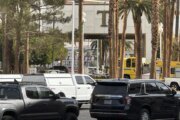Israeli strikes in southern Lebanon killed three Hezbollah fighters on Wednesday, the militant group said, as a U.S. envoy tasked with avoiding a devastating regional war returned to Israel after meeting officials in Lebanon.
Lebanese state media reported multiple Israeli strikes along the border and in an area north of the coastal city of Tyre, about 30 kilometers (20 miles) from the frontier. The Israeli military said two Hezbollah launches damaged several vehicles in northern Israel.
Amos Hochstein, a senior adviser to U.S. President Joe Biden, was back in Israel after meetings in Lebanon on Tuesday. There has been no word on whether he has made progress in his efforts to avoid a wider war.
With the Israeli offensive in Gaza now in its ninth month, international criticism has grown steadily over the U.S. support for Israel’s air and ground attacks. The top United Nations court has concluded there is a “plausible risk of genocide” in Gaza — a charge Israel strongly denies. Israel blames civilian deaths on Hamas, saying militants operate among the population.
Israeli Prime Minister Benjamin Netanyahu claimed Tuesday that the United States was withholding weapons needed for the war in Gaza. Biden has delayed delivering certain heavy bombs to Israel since May over concerns about killing civilians in Gaza. However, U.S. Secretary of State Antony Blinken said Tuesday that those 2,000-pound bombs are the only weapons under review. He told reporters that “Everything else is moving as it normally would.”
Israel’s war against Hamas in Gaza has killed more than 37,100 people, according to Gaza’s Health Ministry, which does not distinguish between combatants and civilians in its count. The war has largely cut off the flow of food, medicine and other supplies to Palestinians who are facing widespread hunger.
Israel launched the war after Hamas’ Oct. 7 attack, in which militants stormed into southern Israel, killed some 1,200 people — mostly civilians — and abducted about 250.
Currently:
— For a second time, a ship attacked by Yemen’s Houthi rebels sinks in the Red Sea.
— Muslim pilgrims wrap up the Hajj with final symbolic stoning of the devil and circling of the Kaaba.
— Israel’s Netanyahu blames Biden for withholding weapons, but U.S. officials say that’s not the whole story.
— Sudan accuses the United Arab Emirates of fueling war with weapons to paramilitary rivals.
Follow AP’s coverage of the war in Gaza at https://apnews.com/hub/israel-hamas-war
Here’s the latest:
US military strikes sites in Yemen controlled by Houthis
U.S. Central Command said Wednesday that its forces had destroyed a ground control station and a command and control node in an area of Yemen controlled by Iranian-backed Houthi rebels.
The U.S. military said in a statement that the sites “presented an imminent threat to U.S. forces, coalition forces and merchant vessels in the region.”
Central Command said its forces also destroyed two Houthi drone boats in the Red Sea.
The statement came hours after authorities said a bulk carrier had sunk in the Red Sea days after an attack by the Houthis.
The U.S. has led a monthslong campaign in the region trying to defend commercial vessels and warships from the attacks, which Houthis claim are in response to the Israel-Hamas war in the Gaza Strip.
Israelis living near Lebanon border say life is growing intolerable
JERUSALEM — As rocket fire from Lebanon streaked over the northern Israeli city of Kiryat Shmona Wednesday, the city’s remaining inhabitants said life there was growing intolerable after eight months of near-daily fighting between Israel and the Hezbollah militant group.
Booms rang out overhead and residents ran for safety. Cars lining the streets bore cracked windshields from past attacks and windows were blown out.
“It is scary,” said Uri Vazan, a resident of Kiryat Shmona. “You don’t know when it is coming to you, suddenly you have an alarm, suddenly missiles fall.”
Israel’s military said 15 rockets from Lebanon were fired at Kiryat Shmona on Wednesday, provoking retaliatory Israeli strikes on Hezbollah targets. The cross-border fighting has turned the formerly bustling Israeli city into a ghost town.
“To be here is not easy. It is scary, it is unbearable, it can’t be contained,” said resident Shishi Phima.
Top U.S. envoy Amos Hochstein visited Israel and Beirut this week as part of efforts to quell tension and help achieve a diplomatic solution that could see residents return to their homes. But progress has seemed elusive. On Tuesday, Israel’s army announced it had “approved and validated” plans for an offensive in Lebanon. On Wednesday, the leader of Hezbollah said the group has new weapons and intelligence capabilities that could help it target more critical positions deeper inside Israel in case of an all-out war.
Cyprus distances itself from military operations in the Middle East
NICOSIA, Cyprus — The president of Cyprus says the east Mediterranean island nation “is in no way involved” in any military operations in the region or elsewhere.
President Nikos Christodoulides was responding Wednesday to remarks by Hezbollah leader Hassan Nasrallah who warned that Cyprus could be implicated in a wider conflict if the island nation allows Israel to use its ports and airports to target Lebanon.
Christodoulides said Nasrallah’s remarks “don’t in any way reflect what’s being attempted, which is to present a picture that Cyprus is involved in military operations.”
The Cypriot president said his country is “part of the solution, not part of the problem” and is recognized throughout the Arab World and internationally through such initiatives such as the Cyprus-Gaza maritime corridor delivering humanitarian aid by ship to the Palestinian territory.
He said there are avenues of communication with both Lebanon and Iran “through diplomatic means.”
Israeli strikes have destroyed more than 70% of Rafah’s facilities and infrastructure, official says
GAZA — Israeli strikes have destroyed more than 70% of the facilities and infrastructure in Rafah, south of the Gaza Strip, head of the Rafah municipality Ahmed al-Sufi said in a statement Wednesday.
He accused Israeli forces of systematically targeting camps in Rafah, adding that entire residential areas in the Al Saudi neighborhood have been destroyed. Al-Sufi didn’t immediately respond to a request for additional information.
Israeli tanks and helicopters fired at a Palestinian ministry building overnight Tuesday in southern Gaza, setting a number of tents next to the warehouse on fire, displaced Palestinians who were sheltered nearby told The Associated Press.
Five people were killed in the attack, according to Palestinian media. The AP was unable to immediately verify this figure.
“We were sleeping at 1 o’clock at night, when suddenly we heard the sound of screaming. We went out running, carried the children and went out running, and we found a fire burning in front of us, a big fire,” said Mohammad Abu Hasera, originally from Gaza City, who was near the warehouse during the attack.
A video circulating on social media and posted by an Israeli military correspondent Wednesday morning shows the Palestinian side of the Rafah crossing, including the terminal, which appears to be the only structure still intact there since the IDF launched its ground operations last month.
UN says its workers were unable to pick up aid due to chaos
UNITED NATIONS — U.N. humanitarian workers weren’t able to pick up desperately needed aid shipments at the Kerem Shalom border crossing from Israel because of the lack of law and order in the area, the United Nations said.
U.N. deputy spokesman Farhan Haq told reporters that even though there was no fighting Wednesday on a new route where Israel has declared a “tactical pause” in daytime military action, the law and order issue prevented U.N. workers from picking up aid.
This means that no trucks carrying aid have been able to use the new route since Israel announced the daily pause Sunday on the road between the Kerem Shalom border crossing and Gaza’s main north-south Salah al-Din Road.
Haq noted that the United Nations has been warning about lawlessness and unrest for several days.
Asked who was responsible, he said, it’s probably a combination of several factors including criminal gangs taking advantage of the unrest and a lot of frightened people who are hungry.
“The responsibility of Israel as the occupying power does not stop at Kerem Shalom where aid is dropped off,” Haq stressed. “It includes ensuring that this assistance reaches women, children and elderly who need it the most and creating the enabling environment to do so.”
Haq said five fuel trucks that traveled via the fence road did enter Gaza Wednesday through the military gate. The U.N. humanitarian office reported these were the first fuel deliveries since early June and supplies remain scarce.
Currently, the U.N. agency helping Palestinian refugees known as UNRWA, estimates that only 65,000 remain in the southern city of Rafah, where 1.4 million people had fled seeking safety. Almost the entire population of Rafah fled after Israel issued evacuation orders about three weeks ago and began military operations.
Haq said large numbers of Palestinians have fled to Khan Younis, Dier al-Balah and other areas of southern Gaza, where he stressed that very limited amounts of food are getting in because of the closure of the Rafah border crossing from Egypt, which had been a main conduit for aid deliveries
Hezbollah says at least 3 fig
hters were killed in Israeli strikes
BEIRUT — The Hezbollah militant group says at least three of its fighters were killed in Israeli strikes on Wednesday as a U.S. envoy works to quell tensions.
Lebanese state media reported multiple Israeli strikes along the border and in an area north of the coastal city of Tyre, about 30 kilometers (20 miles) from the frontier. The Israeli military said two Hezbollah launches damaged several vehicles in northern Israel.
The fighting came as Amos Hochstein, a senior adviser to U.S. President Joe Biden, returned to Israel after meeting with officials in Lebanon on Tuesday. There has been no word on whether he has made progress in his efforts to avoid a devastating regional war.
Kamel Mohanna, the head of the Amel Association, an NGO providing health services in Lebanon, said the group’s primary health center in the town of Khiam was hit and damaged by Israeli shelling. Mohanna said he was visiting another health center in south Lebanon, which had been previously struck and then repaired, when the Khiam center was hit.
Hezbollah began attacking Israel almost immediately after the Israel-Hamas war erupted on Oct. 7. There have been near daily exchanges of fire, though most of the strikes are confined to an area within a few mostly confined to the area around the border.
But the fighting has escalated in recent weeks, raising fears that the clashes could boil over into a full-blown war. Israel’s army announced late Tuesday that it has “approved and validated” plans for an offensive in Lebanon.
Israeli strikes already have killed more than 400 people in Lebanon, most of them Hezbollah fighters, but at least 80 of the fatalities were civilians. In northern Israel, 16 soldiers and 11 civilians have been killed.
Israeli drone strikes kill a Syrian army officer, state media says
DAMASCUS, Syria — A Syrian army officer was killed in an Israeli airstrike Wednesday morning, Syrian state media said.
State news agency SANA reported that Israeli drone strikes hit military sites in the areas of Quneitra and Daraa in southern Syria, killing an officer and resulting in “material damages.”
The Untied Kingdom-based war monitor Syrian Observatory for Human Rights said the strikes came after members of factions affiliated with the Lebanese militia Hezbollah transported the wreckage of an Israeli reconnaissance plane to one of the targeted sites to dismantle it.
There was no immediate comment from the Israeli army on the strikes. Israel frequently launches strikes on Iran-linked targets in Syria but rarely acknowledges them. The strikes have intensified since October against the backdrop of the war in Gaza.
For a second time, a bulk carrier attacked by Yemen’s Houthi rebels sinks in the Red Sea
DUBAI, United Arab Emirates — A bulk carrier sank days after an attack by Yemen’s Houthi rebels believed to have killed one mariner on board, authorities said early Wednesday, the second ship sunk in the rebels’ campaign.
The sinking of the Tutor in the Red Sea marks what appears to be a new escalation by the Iranian-backed Houthis in their campaign targeting shipping through the vital maritime corridor over the Israel-Hamas war in the Gaza Strip.
The attack comes despite a monthslong U.S.-led campaign in the region that has seen the Navy face its most intense maritime fighting since World War II, with near-daily attacks targeting commercial vessels and warship.
The Liberian-flagged, Greek-owned-and-operated Tutor sank in the Red Sea, the British military’s United Kingdom Maritime Trade Operations center said in a warning to sailors in the region. The Houthis, quoting foreign reports in media outlets they control, acknowledged the sinking. The U.S. military did not acknowledge the sinking, nor did it respond to requests for comment.
United Nations human rights office spotlights 6 Israeli attacks on Gaza as possible crimes against humanity
GENEVA — The United Nations human rights office has spotlighted six deadly bombing attacks by Israeli defense forces in Gaza during the first nine weeks of the war, saying they could amount to crimes against humanity.
The rights office says that more than eight months into the conflict, and despite commitments from Israel to look into such attacks, authorities have not produced transparent or credible investigations. Volker Turk, the U.N. human rights chief, said the requirement under international law that combatants avoid or minimize harm to civilians “appears to have been consistently violated” in Israel’s bombing campaign.
The comments came along with the release of a new report Wednesday that seeks to highlight the dangers posed to civilians of the use of powerful weapons, including 2,000-pound GBU-31 bombs. It said a Dec. 2 attack on Shujaiya neighborhoods of Gaza City destroyed 15 buildings and damaged 14 others. Three of the strikes, it said, came with no advance warning.
Israeli authorities responded by defending their respect for proportionality and principle of distinction under international law. They also accused the rights office of bias and said it didn’t have full information about the circumstances of the military operations.
The report, while mainly focusing on Israel, also said Palestinian armed groups have fired discriminately into Israel, possibly violating international law.
The office said part of the reason why the six attacks were spotlighted among thousands carried out was because it had extensive information about them.
Copyright © 2025 The Associated Press. All rights reserved. This material may not be published, broadcast, written or redistributed.






